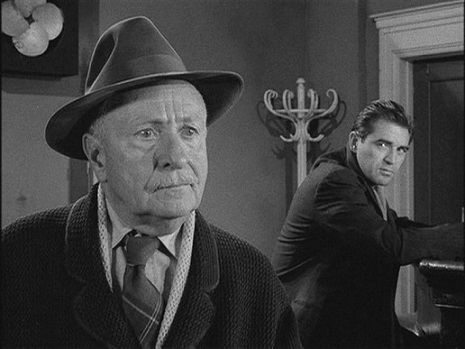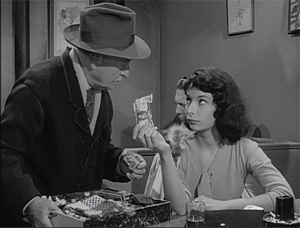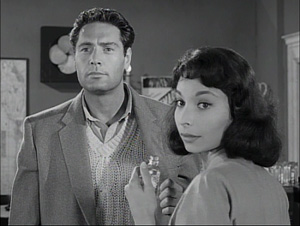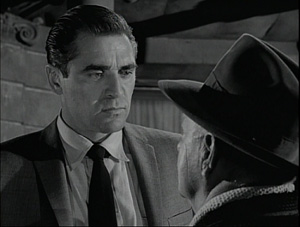A Most Unusual Christmas Gift: "What You Need"
by Michael Martin DeSapio
A street peddler who has the uncanny ability to give people exactly what they need before they need it; an embittered man on the prowl for an escape from his hopeless rut; and the rain-slicked city streets at night. Around these elements Rod Serling wove one of the most charming and elegantly crafted tales from The Twilight Zone's first season: "What You Need." Originally aired on Christmas Day 1959 (a unique occurrence during the series' run), "What You Need" is an urban fantasy folk tale which trades on the far-reaching effects of ordinary things—bus tickets, scissors, shoes, pens. The episode is well written and acted, handsomely filmed, and has an aura of stylish good taste that was typical of TZ's first season. Although seldom discussed, "What You Need" remains a steady favorite among Twilight Zone fans and, because its simplicity conceals the artistry that was a hallmark of this series, merits a second look.
Strange as it might seem to assign this rather dark story for broadcast on Christmas Day, the choice was apt: the episode deals with gift-giving and spiritual values, and its central character is a Santa Claus-like figure. Serling based his script on a short story by the husband-and-wife writing team of Henry Kuttner and C.L. Moore. In adapting the story, Serling changed Kuttner and Moore's fortune-telling machine to a clairvoyant street peddler, Pedott, who dispenses items from a suitcase. This move is illustrative of Serling's human touch, his tendency not to rely too heavily on science fiction contrivances. Pedott's "Santa Claus" quality (not as explicit as in the case of Lewis J. Bookman of "One for the Angels," who dispenses his gifts to children) is especially evident in his giving away items free of charge, his only reward the pleasure of having made the person happy. Pedott's "sales" are not a mere mechanism but an authentically human transaction, based on looking directly at the person and divining his or her future needs.
The episode begins with an establishing shot of the city streets accompanied by cool-jazz piano music, and we enter a bar. This is a place where downcast people go to drown their sorrows, and we will meet three such people in the course of this story. Nevertheless the bar is well lit and well patronized, and the atmosphere is more cozy than desolate. (A poster on the wall reading "Nightmare" serves as a foreboding omen.) We meet the bartender, who enjoys sarcastically heckling his regular customers-one of whom is Lefty, an ex-baseball player who was forced to quit his career because of a "sour" arm and now "looks for a baseball career in the bottom of a bottle." Meanwhile, a nameless Girl sits in a side booth, melancholy and apparently lonely. The street vendor Pedott (the name suggests "peddler" as well as "Pierrot," the sad clown of commedia dell'arte) enters to sell his wares. The seemingly banal gifts he produces—a bus ticket to Scranton, Pennsylvania for Lefty, a bottle of cleaning fluid for the Girl—affect the recipients in life-altering ways: providing Lefty transportation to a new job, getting the spot out of his interview suit, and kindling a romance. We might note that the cleaning fluid functions as a symbol of healing and cleansing for past misfortune and mistakes.
"You're looking at Mr. Fred Renard, who carries on his shoulder a chip the size of the national debt..."
All this time we have been aware of the glowering presence in the bar of Fred Renard—"a sour man, a friendless man, a grasping, compulsive, nervous man" (the description recalls Dickens' Ebeneezer Scrooge). If Pedott represents disinterested goodness, Renard represents human nature's dark, obsessive, exploitative side. Having watched with interest Pedott's transactions in the bar, Renard confronts him outside and asks him to give him what he needs that night. Pedott gives him a pair of scissors: this is the first of three gifts Renard will get during the course of the episode, a nod to the traditional "three wishes" device of folklore. Later that night, the scissors end up saving Renard's life when his scarf becomes caught in an elevator door. Still later, after Renard shows up uninvited in Pedott's apartment and demands more things, Pedott (fearful of Renard and wishing to placate him) comes up with a leaky fountain pen that helps Renard pick out the name of the winning horse in a race. Although both Pedott and Renard dwell on the margins of society (Renard seems to have no occupation besides looking for getting-rich schemes), the two men's attitudes are in stark contrast. Renard is materialistic, dependent, parasitical, in constant need of sensations and stimulants; he wants to go into partnership with Pedott-that is, to use Pedott as a money-making device. Pedott is self-sufficient: "I don't need a partner," he says, "I don't need anything. I'm content." While Pedott uses objects to help people, Renard uses people like objects. The relationship between the two men suggests that of addict and dope peddler. "I just want you to keep supplying me with what I need," Renard says feverishly; "Whatever it is, I want it to keep comin'. I don't want it to stop." As in Richard Matheson's episode "Nick of Time," fortune-telling becomes a kind of drug. Pedott, on the other hand, represents temperance, wisdom and moderation; he declares that he must use his special talent "sparingly."

The underlying theme of "What You Need" is gratitude, a recognition of the goodness of life. Renard's basic sin is ingratitude. In contrast to Pedott, whose whole life is based on self-giving, Renard is merely a taker; he can't even be bothered to give a tip to the hotel clerk who brings him his newspaper, despite having just won hundreds of dollars on the races. Even after having had his life saved by Pedott's gift of scissors, Renard only shows up to demand more. Serling's script refuses to excuse Renard's actions simply because he didn't get a "fair shake" in life; on the contrary, the economy of the Twilight Zone holds him accountable.
Everything comes to a head in the final "showdown" between Renard and Pedott in the street. Renard's magic pen has run dry, and he is angry at the one-time-only nature of Pedott's gifts. The source of Renard's bitterness and sense of entitlement comes out: "I was born under a lousy zodiak or something. I've been getting the dirty end of the stick ever since I was four years old." Pedott says that he is unable to give Renard the things he really needs, because they are spiritual in nature. "The things you need most I can't supply. Serenity, peace of mind, humor, the ability to laugh at yourself...patience." Ultimately "What You Need" is about what all of us "need": the values that are necessary to sustain our human existence, the lasting goods of the soul.
Renard, however, wants immediate gratification. He rummages around in the suitcase and picks out a box of shoes, which he proceeds to put on, assuming they will take him where he needs to go. They are a size too small and have slippery soles. The shoes turn out to be Renard's demise and Pedott's salvation: while attempting to come after Pedott, Renard is incapacitated by the leathery soles and the wet pavement and is hit by a speeding car. In a brief soliloquy, Pedott explains that the shoes were what he (Pedott) needed, because he foresaw that Renard would kill him ("Mr. Renard, what I saw in your eyes at that bar was death.") We might note that Renard's name—French for "fox"—is ironic, since it is Pedott who "outfoxed" him.

The tone lightens somewhat for the closing scene: a couple has been aroused from slumber by the noise of the accident, and Pedott takes the opportunity to give the husband a comb out of his suitcase. At first the husband scoffs at this gift; but a moment later, the comb turns out to be just what he needs to groom himself before he and his wife are photographed as witnesses for a newspaper story. The man unthinkingly takes the comb out of his pocket: Serling's point about gratitude and recognition is driven home again.
As Rod Serling pronounces his closing narration, we are left with a doleful series of images: the ambulance bearing away Renard's body, his empty shoes in the street, and the neon lights of the city, as the camera pans up to the night sky.
"Street scene, night. Traffic accident. Victim named Fred Renard, gentleman with a sour face to whom contentment came with difficulty. Fred Renard, who took all that was needed—in The Twilight Zone."
"What You Need" is best enjoyed without over-analyzing the science-fiction mechanisms at work-the apparently selective nature of Pedott's ability to predict the future, for example, or his odd ability to conjure up objects out of nowhere; or, indeed, why the car happened along at exactly the right moment to hit Renard. Nor should one over-think the justice of Renard's fate; it is clear that Pedott foresaw that Renard would attempt to kill him and acted in self-defense. It's important to note too that Renard himself picked out the shoebox, despite Pedott's warning—in effect, chose his own death. (For that matter, it is never stated that Renard died; a "hit and run" could denote a non-fatal accident.)
"What You Need" takes place entirely at night, and—as with "The Four of Us Are Dying," "Mirror Image," and a number of other episodes—the nocturnal black and white photography helps link The Twilight Zone with film noir and makes this an attractive episode to watch. The scene in the bar is beautifully filmed, with Alvin Ganzer's direction and George Clemens' camera work underlining the scene's intrigue (Renard's sinister sideways glances at Pedott, Pedott's beaming across the room at the young couple, etc.). The elevator scene, in which Renard narrowly escapes death by strangulation thanks to a pair of scissors, can only be described as a nail-biter. The specially composed, unobtrusive musical score by Nathan Van Cleave adds to the episode's atmosphere.
The episode boasts two first-rate actors in the lead roles: Ernest Truex and Steve Cochran. Truex started out as a Shakespearean stage actor, appeared in films as far back as 1913, and became one of Hollywood's (and later television's) specialists in meek character parts; he would later star in the poignant third-season Twilight Zone episode "Kick the Can." Interestingly, considering his role in "What You Need," Truex was among the actors considered for the role of Willy Loman in the original Broadway production of Arthur Miller's Death of a Salesman (the role eventually went to Lee J. Cobb). Steve Cochran specialized in film noir, often playing gangsters and heels. One critic has faulted Cochran for overacting in this episode, but in fact his performance-and particularly his facial expressions-give texture to the character, balancing the predominant menacing cruelty with hints of vulnerability and loneliness. The Girl and Lefty (Arlene Martel (then credited as Arline Sax) and Read Morgan) make for an unforgettable vignette, the sweet start of a "salvation through love" story; the couple acts as a foil to the potentially tragic pair of Pedott/Renard and gives the tale an infusion of warmth and hope.

Happily, this particular Christmas offering of Rod Serling's (coinciding, incidentally, with his thirty-fifth birthday) didn't come burdened with icicles, Santas, sleighs, and the usual sentimental trappings of the holiday. Instead, audiences got a gritty morality play, virtue and vice having a showdown on the rain-soaked streets of a modern city. The Twilight Zone would go on to produce episodes that were more startling and innovative, less predictable and conventional than "What You Need"—but few that were as attractive, charming, or comfortingly human.
To contact Michael, send email to michaelmartind@gmail.com
